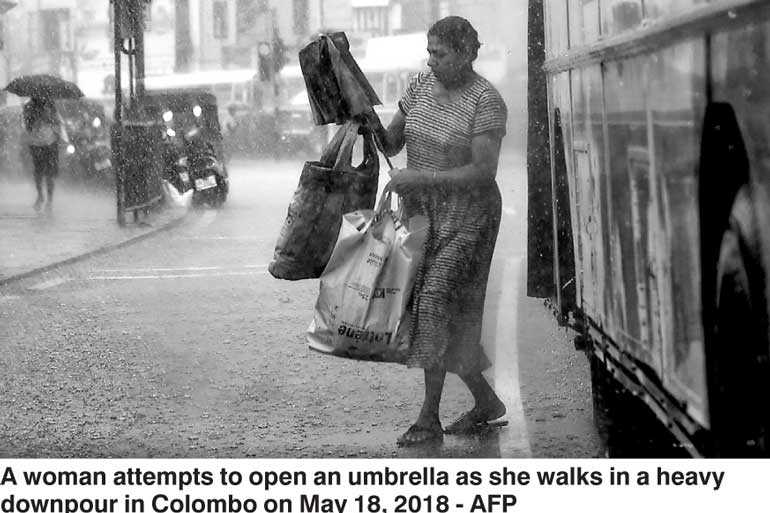Friday Feb 27, 2026
Friday Feb 27, 2026
Saturday, 19 May 2018 00:00 - - {{hitsCtrl.values.hits}}

The Sri Lanka Red Cross Society and its Disaster Response Units located in every branch of the country (each in every district) has been put on high alert as the inter-monsoonal rainy season sets above the country. As of now rains calculated to be over 100mm can be experienced in southern and eastern parts of the country, with thundershowers being expected in other parts.
Rainfall in Sri Lanka has multiple origins. Monsoonal, conventional and depressional rain accounts for a major share of the annual rainfall. The mean annual rainfall varies from under 900mm in the driest parts (south-eastern and north-western) to over 5,000mm in the wettest parts (western slopes of the central highlands).
Last year (2017) alone rains during the monsoonal period’s incessant rains across Sri Lanka affected over half a million people in seven districts. Most affected was the Ratnapura District where over 20,000 people faced flash floods. In Galle, Neluwa, Tawalama, Niyagama and Baddegama areas were flooded as well.
Recently a meeting was called by Sri Lanka Red Cross President Jagath Abeysinghe, who briefed the Disaster Response Units of the society to be on alert in order to respond to any adverse situation that could arise due to the inclement weather.
“Our volunteers are currently being alerted to be on standby to assist any vulnerable communities all across the island,” said President Abeysinghe. “One of the key strengths of our response has always been that most of our volunteers are from the communities itself, so they are already there if anything goes wrong to help and assist.”
Warehouses located at every branch deemed to be vulnerable towards floods have been stockpiled with supplies, while necessary funds have also been allocated to the branches by the National Headquarters.
One key feature of this year’s flood and disaster response will be the utilization of modern technology to track and assist affected communities. The Colombo Branch of the Sri Lanka Red Cross will be utilising drones to map out and assess disaster-prone areas which will allow first responders to reach affected communities much faster.
Central Governing Board Member and Secretary of the Colombo Branch Dr. Amila Kankanamge said: “This is something new we are trying in the face of these intense disasters that continue to gain strength each year. We cannot be looking at these future disasters from the same angle we used to. The dynamics are changing and the response should too. That’s why we are opting to use modern technology in order to assist the most vulnerable people in our district.”
Meanwhile, the Meteorological Department of Sri Lanka forecasts more rains during the coming weeks.